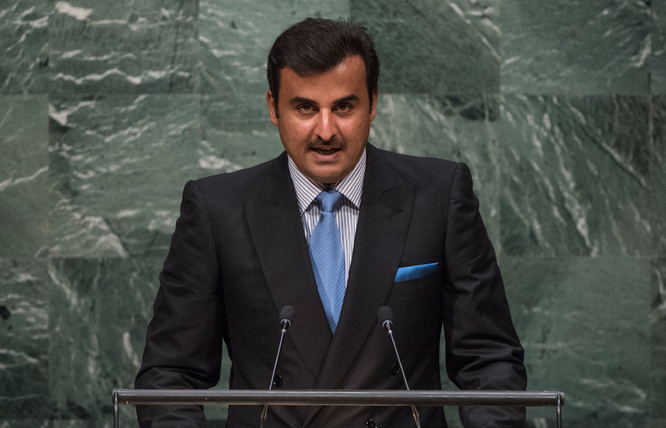by Giorgio Cafiero
On July 21, Qatar’s Emir Sheikh Tamim bin Hamad Al Thani delivered his first speech since the “quartet” – Bahrain, Egypt, Saudi Arabia, and the United Arab Emirates (UAE) – severed ties with Doha last month. In his 17-minute address, the emir declared that his country was ready for talks aimed at resolving the seven-week-old row, yet would never relinquish its rights as a sovereign and independent country.
Defiantly, the Qatari monarch affirmed that everything was business as usual in his country despite the “siege.” He declared that the ongoing crisis has made Qataris more autonomous and resilient. Maintaining that Doha is combatting terrorism and extremism “relentlessly and without compromise,” and doing so with the international community’s blessing, Emir Tamim blasted the quartet for waging a “unprecedented smearing campaign” against the emirate. The Qatari leader included a message of solidarity with the Palestinian people, invoking both pan-Arab and pan-Islamic causes by condemning the closure of the al-Aqsa Mosque.
As the emir delivered his speech, a positive turning point in the Qatar crisis seemed in the offing. First, the quartet shifted its focus from a list of 13 demands to six core principles dealing with the struggle against extremism and terrorism. Second, the emir issued a decree one day before his speech that established new parameters for defining terrorism, cracking down on the financing of terrorism from Qatari soil and working with a new national “terrorism” list, which the UAE’s state minister for foreign affairs welcomed as a “positive step.” Abu Dhabi’s chief diplomat also said that Kuwait’s decision to expel Iranian diplomats on July 20 for Tehran’s alleged role in a “spy and terror” cell uncovered in August 2015 somewhat assuaged the Saudi/UAE-led bloc’s concerns about Qatar’s ties with Iran.
Yet scores of government officials and political commentators in the quartet countries responded quickly and negatively to the emir’s speech, rejecting it as a basis for resolving the crisis. In fact, the day of the emir’s speech, Egypt’s representative to the United Nations addressed a Security Council meeting in which the body decided to renew sanctions on al-Qaeda and the Islamic State, and he accused Qatar of continuing to patronize such extremists. The following day, the UAE declared that Qatar would need to change its policies prior to the opening of any dialogue without specifying which ones. On July 25, the quartet announced the designation of nine entities (Libya- and Yemen-based media outlets, militias, and charitable organizations) and nine individuals (all Libyan, Qatari, and Yemeni nationals) as terrorists for their alleged links with extremists in several Arab countries. This will certainly be yet another stumbling block to bringing the two sides of this rift closer to negotiations.
Ultimately, the conflict boils down to the fact that there still are fundamental disagreements over who is a terrorist in the Middle East and which regional groups and movements are extremist. Indeed, Qatar’s ties with the Islamic Republic of Iran, the Muslim Brotherhood, Hamas, and other Sunni Islamist factions are not new, nor did Tehran and these non-state actors’ relations with Doha recently become a problem for the country’s position within the GCC. Yet this ongoing row may well continue until/unless the involved parties reach a reconciliation in which both sides accommodate the legitimate concerns of the other and find common ground with respect to Iran’s ascendancy and political Islam.
If Emir Tamim’s speech does not precede a new chapter of sincere dialogue and compromise in the Qatar crisis, the long-term prospects for the GCC remaining a six-member institution will dim and disintegration will become an increasingly likely outcome. The Qataris have proven capable of weathering the economic impact of the quartet’s sanctions while securing support from Western powers, Kuwait, Oman, Iran, Turkey, and Asian countries. The current level of pressure on Doha will not likely result in Qatar capitulating. Should Doha not make changes in its conduct sufficient to secure restored relations with the Saudi/UAE-led bloc, “a parting of ways,” as the UAE’s chief diplomat warned last month, may become the next major development in the Qatar crisis.
Established in 1981, the GCC was a Saudi-led initiative aimed at protecting the Arabian Peninsula’s sheikdoms from external threats, chiefly the nascent Islamic Republic of Iran. But times have changed significantly. During the Council’s early years, Qatar and the UAE were not wealthy and geopolitically influential states in the Middle East and Saudi Arabia was a far more dominant player within the Council and the Arab world at large. Today, however, the GCC members are divided with respect to counter-terrorism narratives and reactions to grassroots political activism in the region.
As Emir Tamim emphasized in his speech, Qatar does not envision a future GCC in which all members have to agree on all issues. Assuming that Doha refuses to sever its relations with a host of actors that other GCC governments classify as terrorist organizations and Abu Dhabi maintains its staunchly anti-Islamist foreign policy, an ongoing battle of narratives will continue to leave the GCC divided on terrorism, among other issues. How long can the six members of the GCC continue to function as a bloc given such differences?
Photo: Tamim bin Hamad Al Thani (UN)





